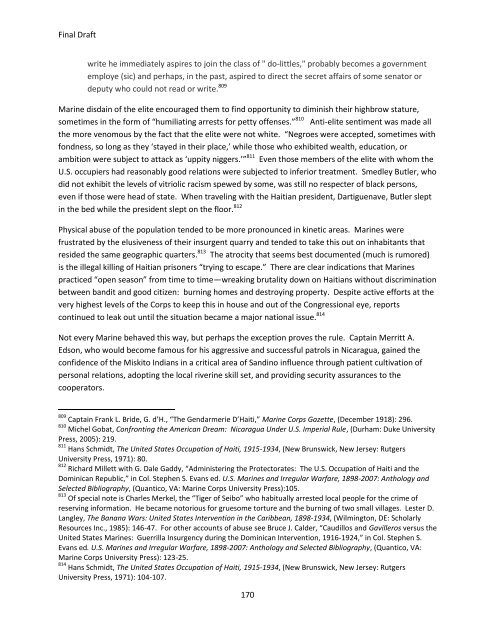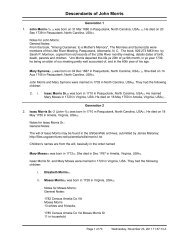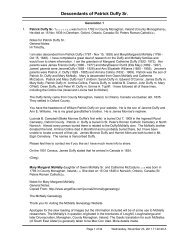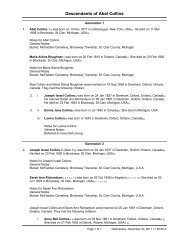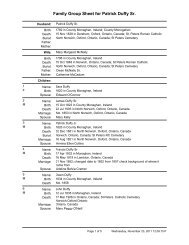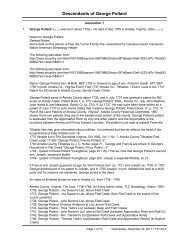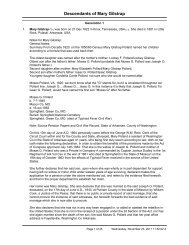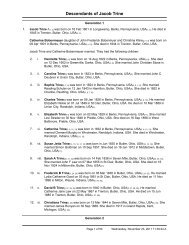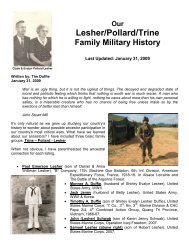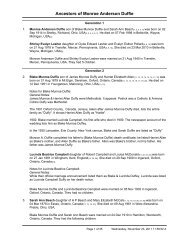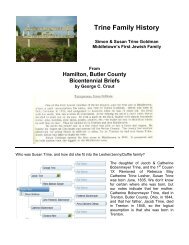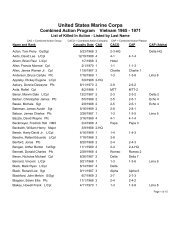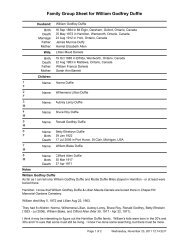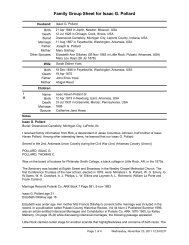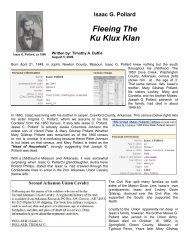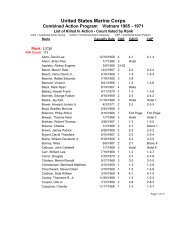Assessing the Strategic Impact of Service Culture on ...
Assessing the Strategic Impact of Service Culture on ...
Assessing the Strategic Impact of Service Culture on ...
Create successful ePaper yourself
Turn your PDF publications into a flip-book with our unique Google optimized e-Paper software.
Final Draft<br />
write he immediately aspires to join <str<strong>on</strong>g>the</str<strong>on</strong>g> class <str<strong>on</strong>g>of</str<strong>on</strong>g> " do-littles," probably becomes a government<br />
employe (sic) and perhaps, in <str<strong>on</strong>g>the</str<strong>on</strong>g> past, aspired to direct <str<strong>on</strong>g>the</str<strong>on</strong>g> secret affairs <str<strong>on</strong>g>of</str<strong>on</strong>g> some senator or<br />
deputy who could not read or write. 809<br />
Marine disdain <str<strong>on</strong>g>of</str<strong>on</strong>g> <str<strong>on</strong>g>the</str<strong>on</strong>g> elite encouraged <str<strong>on</strong>g>the</str<strong>on</strong>g>m to find opportunity to diminish <str<strong>on</strong>g>the</str<strong>on</strong>g>ir highbrow stature,<br />
sometimes in <str<strong>on</strong>g>the</str<strong>on</strong>g> form <str<strong>on</strong>g>of</str<strong>on</strong>g> “humiliating arrests for petty <str<strong>on</strong>g>of</str<strong>on</strong>g>fenses.” 810 Anti-elite sentiment was made all<br />
<str<strong>on</strong>g>the</str<strong>on</strong>g> more venomous by <str<strong>on</strong>g>the</str<strong>on</strong>g> fact that <str<strong>on</strong>g>the</str<strong>on</strong>g> elite were not white. “Negroes were accepted, sometimes with<br />
f<strong>on</strong>dness, so l<strong>on</strong>g as <str<strong>on</strong>g>the</str<strong>on</strong>g>y ‘stayed in <str<strong>on</strong>g>the</str<strong>on</strong>g>ir place,’ while those who exhibited wealth, educati<strong>on</strong>, or<br />
ambiti<strong>on</strong> were subject to attack as ‘uppity niggers.’” 811 Even those members <str<strong>on</strong>g>of</str<strong>on</strong>g> <str<strong>on</strong>g>the</str<strong>on</strong>g> elite with whom <str<strong>on</strong>g>the</str<strong>on</strong>g><br />
U.S. occupiers had reas<strong>on</strong>ably good relati<strong>on</strong>s were subjected to inferior treatment. Smedley Butler, who<br />
did not exhibit <str<strong>on</strong>g>the</str<strong>on</strong>g> levels <str<strong>on</strong>g>of</str<strong>on</strong>g> vitriolic racism spewed by some, was still no respecter <str<strong>on</strong>g>of</str<strong>on</strong>g> black pers<strong>on</strong>s,<br />
even if those were head <str<strong>on</strong>g>of</str<strong>on</strong>g> state. When traveling with <str<strong>on</strong>g>the</str<strong>on</strong>g> Haitian president, Dartiguenave, Butler slept<br />
in <str<strong>on</strong>g>the</str<strong>on</strong>g> bed while <str<strong>on</strong>g>the</str<strong>on</strong>g> president slept <strong>on</strong> <str<strong>on</strong>g>the</str<strong>on</strong>g> floor. 812<br />
Physical abuse <str<strong>on</strong>g>of</str<strong>on</strong>g> <str<strong>on</strong>g>the</str<strong>on</strong>g> populati<strong>on</strong> tended to be more pr<strong>on</strong>ounced in kinetic areas. Marines were<br />
frustrated by <str<strong>on</strong>g>the</str<strong>on</strong>g> elusiveness <str<strong>on</strong>g>of</str<strong>on</strong>g> <str<strong>on</strong>g>the</str<strong>on</strong>g>ir insurgent quarry and tended to take this out <strong>on</strong> inhabitants that<br />
resided <str<strong>on</strong>g>the</str<strong>on</strong>g> same geographic quarters. 813 The atrocity that seems best documented (much is rumored)<br />
is <str<strong>on</strong>g>the</str<strong>on</strong>g> illegal killing <str<strong>on</strong>g>of</str<strong>on</strong>g> Haitian pris<strong>on</strong>ers “trying to escape.” There are clear indicati<strong>on</strong>s that Marines<br />
practiced “open seas<strong>on</strong>” from time to time—wreaking brutality down <strong>on</strong> Haitians without discriminati<strong>on</strong><br />
between bandit and good citizen: burning homes and destroying property. Despite active efforts at <str<strong>on</strong>g>the</str<strong>on</strong>g><br />
very highest levels <str<strong>on</strong>g>of</str<strong>on</strong>g> <str<strong>on</strong>g>the</str<strong>on</strong>g> Corps to keep this in house and out <str<strong>on</strong>g>of</str<strong>on</strong>g> <str<strong>on</strong>g>the</str<strong>on</strong>g> C<strong>on</strong>gressi<strong>on</strong>al eye, reports<br />
c<strong>on</strong>tinued to leak out until <str<strong>on</strong>g>the</str<strong>on</strong>g> situati<strong>on</strong> became a major nati<strong>on</strong>al issue. 814<br />
Not every Marine behaved this way, but perhaps <str<strong>on</strong>g>the</str<strong>on</strong>g> excepti<strong>on</strong> proves <str<strong>on</strong>g>the</str<strong>on</strong>g> rule. Captain Merritt A.<br />
Eds<strong>on</strong>, who would become famous for his aggressive and successful patrols in Nicaragua, gained <str<strong>on</strong>g>the</str<strong>on</strong>g><br />
c<strong>on</strong>fidence <str<strong>on</strong>g>of</str<strong>on</strong>g> <str<strong>on</strong>g>the</str<strong>on</strong>g> Miskito Indians in a critical area <str<strong>on</strong>g>of</str<strong>on</strong>g> Sandino influence through patient cultivati<strong>on</strong> <str<strong>on</strong>g>of</str<strong>on</strong>g><br />
pers<strong>on</strong>al relati<strong>on</strong>s, adopting <str<strong>on</strong>g>the</str<strong>on</strong>g> local riverine skill set, and providing security assurances to <str<strong>on</strong>g>the</str<strong>on</strong>g><br />
cooperators.<br />
809 Captain Frank L. Bride, G. d’H., “The Gendarmerie D’Haiti,” Marine Corps Gazette, (December 1918): 296.<br />
810 Michel Gobat, C<strong>on</strong>fr<strong>on</strong>ting <str<strong>on</strong>g>the</str<strong>on</strong>g> American Dream: Nicaragua Under U.S. Imperial Rule, (Durham: Duke University<br />
Press, 2005): 219.<br />
811 Hans Schmidt, The United States Occupati<strong>on</strong> <str<strong>on</strong>g>of</str<strong>on</strong>g> Haiti, 1915-1934, (New Brunswick, New Jersey: Rutgers<br />
University Press, 1971): 80.<br />
812 Richard Millett with G. Dale Gaddy, “Administering <str<strong>on</strong>g>the</str<strong>on</strong>g> Protectorates: The U.S. Occupati<strong>on</strong> <str<strong>on</strong>g>of</str<strong>on</strong>g> Haiti and <str<strong>on</strong>g>the</str<strong>on</strong>g><br />
Dominican Republic,” in Col. Stephen S. Evans ed. U.S. Marines and Irregular Warfare, 1898-2007: Anthology and<br />
Selected Bibliography, (Quantico, VA: Marine Corps University Press):105.<br />
813 Of special note is Charles Merkel, <str<strong>on</strong>g>the</str<strong>on</strong>g> “Tiger <str<strong>on</strong>g>of</str<strong>on</strong>g> Seibo” who habitually arrested local people for <str<strong>on</strong>g>the</str<strong>on</strong>g> crime <str<strong>on</strong>g>of</str<strong>on</strong>g><br />
reserving informati<strong>on</strong>. He became notorious for gruesome torture and <str<strong>on</strong>g>the</str<strong>on</strong>g> burning <str<strong>on</strong>g>of</str<strong>on</strong>g> two small villages. Lester D.<br />
Langley, The Banana Wars: United States Interventi<strong>on</strong> in <str<strong>on</strong>g>the</str<strong>on</strong>g> Caribbean, 1898-1934, (Wilmingt<strong>on</strong>, DE: Scholarly<br />
Resources Inc., 1985): 146-47. For o<str<strong>on</strong>g>the</str<strong>on</strong>g>r accounts <str<strong>on</strong>g>of</str<strong>on</strong>g> abuse see Bruce J. Calder, “Caudillos and Gavilleros versus <str<strong>on</strong>g>the</str<strong>on</strong>g><br />
United States Marines: Guerrilla Insurgency during <str<strong>on</strong>g>the</str<strong>on</strong>g> Dominican Interventi<strong>on</strong>, 1916-1924,” in Col. Stephen S.<br />
Evans ed. U.S. Marines and Irregular Warfare, 1898-2007: Anthology and Selected Bibliography, (Quantico, VA:<br />
Marine Corps University Press): 123-25.<br />
814 Hans Schmidt, The United States Occupati<strong>on</strong> <str<strong>on</strong>g>of</str<strong>on</strong>g> Haiti, 1915-1934, (New Brunswick, New Jersey: Rutgers<br />
University Press, 1971): 104-107.<br />
170


